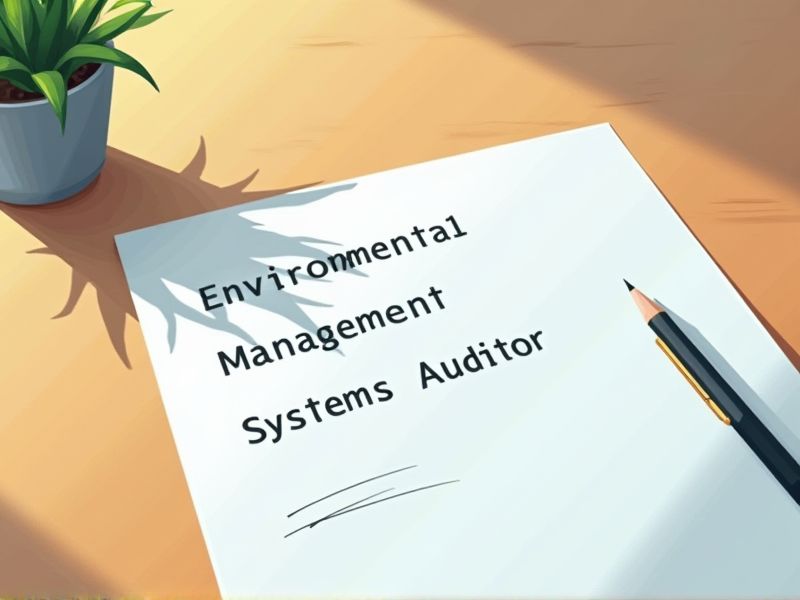
An Environmental Management Systems (EMS) Auditor is responsible for assessing compliance with environmental standards and practices. Certification ensures auditors possess the knowledge and skills essential for evaluating systems effectively. Such credentials validate their understanding of regulations, enhancing credibility and reliability in their assessments. Below are some certifications essential for an Environmental Management Systems Auditor.
ISO 14001:2015 Lead Auditor Certification
ISO 14001:2015 Lead Auditor Certification ensures an auditor understands the standard's requirements, enabling effective assessment of environmental management systems for compliance. Firms require this certification to demonstrate their auditors are proficient in identifying areas for improvement, consequently reducing environmental risks. Certified auditors are better equipped to implement best practices, leading to enhanced environmental performance and regulatory compliance. Possession of this certification typically boosts an auditor's credibility, thus increasing trust among stakeholders and clients.
ISO 14001:2015 Internal Auditor Certification
Being certified in ISO 14001:2015 as an Internal Auditor elevates an individual's competency in assessing environmental management systems (EMS), leading to more accurate and efficient audits. Certification ensures auditors are well-versed in the latest EMS standards, fostering improved environmental performance and compliance for organizations. The certification process includes understanding risk assessments, which is vital for identifying areas of improvement in an EMS. Organizations with certified internal auditors often experience enhanced operational efficiency and better stakeholder trust due to consistent environmental practices.
Certified Environmental Auditor (CEA)
The role of a Certified Environmental Auditor (CEA) ensures compliance with environmental regulations and helps organizations avoid legal penalties. CEAs bring specialized knowledge that enhances the accuracy and effectiveness of Environmental Management Systems (EMS) audits. Their expertise aids in identifying areas for improvement, fostering environmentally sustainable practices within the organization. Hiring a CEA demonstrates a commitment to environmental responsibility, potentially improving public image and stakeholder confidence.
Certified Environmental Management Systems Auditor (CEMS Auditor)
CEMS Auditors are crucial for ensuring compliance with environmental regulations, which reduces the risk of legal penalties for organizations. Their expertise in evaluating and improving Environmental Management Systems (EMS) enhances an organization's operational efficiency by identifying potential areas of resource waste. By providing objective assessments, they help organizations achieve and maintain certifications like ISO 14001, which can boost reputation and stakeholder trust. Their insights contribute to the continuous improvement of EMS, leading to better environmental performance and sustainability practices.
OHSAS 18001/ISO 45001 Lead Auditor Certification
Being certified as an OHSAS 18001/ISO 45001 Lead Auditor enhances the ability to effectively assess health and safety management's adherence to standards. This certification equips auditors with skills to identify potential safety risks, crucial for integrating comprehensive environmental management. Organizations seek auditors with this certification to ensure robust systems that align with both health and environment aspects. The need for a holistic approach to safety and environmental management drives the requirement for such certified auditors.
NEBOSH Environmental Management Certificate
The NEBOSH Environmental Management Certificate equips auditors with essential knowledge on environmental management, crucial for assessing compliance with environmental standards. This qualification provides an in-depth understanding of key environmental issues, enabling auditors to identify and address potential risks effectively. Knowledge from this certification aids in implementing international best practices, which is vital for enhancing environmental performance. Organizations benefit from auditors who hold this certificate as they ensure more comprehensive and reliable environmental management systems evaluations.
IEMA Certificate in Environmental Management
IEMA Certificate in Environmental Management provides a foundational understanding of environmental principles, crucial for an Environmental Management Systems Auditor. This certification ensures auditors are equipped with the necessary knowledge to assess compliance with environmental regulations and standards. An auditor with IEMA certification can recognize operational improvements to minimize environmental impact effectively. It emphasizes sustainable practices, enhancing the credibility and reliability of audits conducted.
Certified Sustainability Auditor (CSA)
The increasing complexity of environmental regulations necessitates the expertise of a Certified Sustainability Auditor (CSA) to ensure compliance and effectiveness in Environmental Management Systems (EMS). Businesses and organizations are under growing pressure to demonstrate transparency and accountability in their environmental practices, making a CSA crucial for credible and thorough evaluations. The depth of knowledge a CSA brings enables the identification of inefficiencies and potential improvements, driving sustainability goals forward. A CSA plays a vital role in validating ESG credentials, which are increasingly critical for investor relations and stakeholder trust.
Environmental Compliance Professional Certification
Environmental Compliance Professional Certification equips auditors with essential knowledge of current regulations, enhancing their ability to identify non-compliance issues within environmental management systems. Certifying auditors fosters trust and credibility, ensuring stakeholders can rely on the auditor's assessments in regulatory or contractual obligations. Certified professionals are often better prepared to implement best practices, reducing environmental risks and improving sustainability outcomes. Increasingly stringent environmental laws necessitate updated expertise among auditors, which this certification provides.
Green Auditor Certification
Green Auditor Certification enhances credibility, as it signifies an auditor's expertise in sustainability practices, leading to increased trust from stakeholders. It equips auditors with the necessary skills to effectively assess and verify organizations' compliance with environmental standards. Incorporating certified green auditors can facilitate more accurate identification of environmental risks and opportunities for improvement. Organizations that employ such certified professionals often see better alignment of their environmental objectives with broader sustainability goals.
Summary
You, as an Environmental Management Systems Auditor with certifications, can expect enhanced credibility and trust from clients and employers. This increased trust often leads to more job opportunities and career advancement. Certified auditors typically see improved proficiency in identifying and managing environmental risks more effectively. With certification, your expertise is recognized, potentially resulting in better compensation and professional recognition.
